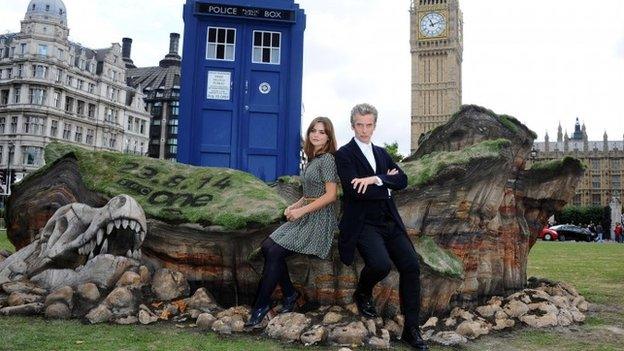Scottish independence issues at-a-glance: Broadcasting
- Published

What powers does the Scottish Parliament currently have and how might they change with independence or further devolution?
This page summarises the implications of the referendum for broadcasting - one of seven different themes. The others are: The , external, external, , external, , external, , external and defence.
More in-depth analysis on broadcasting.

At present
The BBC is a public corporation established by Royal Charter. It is paid for by the public directly through their TV licences. In the event of a "Yes" vote, the future of the BBC as a public service in Scotland would have to be negotiated.
STV is a private business and has a commercial deal with ITV to buy in the network programmes. Similarly, there would be no direct impact on Channels 4 and 5. The Scottish government has promised to respect the licences of the other commercial channels. They all provide UK-wide services and the majority are also available on satellite and cable in the Republic of Ireland.
BBC Alba is run by the BBC in a partnership arrangement with the Gaelic media service MG Alba. Most of its programmes are actually paid for by MG Alba (currently funded by both the Scottish and UK governments) while others are paid for out of the BBC's own money.

After a Yes vote
The Scottish government hopes to create a Scottish Broadcasting Service in 2017 - built around the assets and staff of BBC Scotland. It says the SBS would work in a partnership agreement with the BBC. That way Scots would still be able to watch, listen and read the full range of BBC programmes while, it argues, the SBS would still be able to provide programmes for BBC channels.
The government argues the main advantage of this arrangement would be that more money would be spent on broadcasting in Scotland and that the new broadcaster would be more accountable to the Scottish public.
In the event of a separate Scottish Broadcasting Service being created, BBC Alba would come under its umbrella while an independent Scottish government would, presumably, be solely responsible for funding MG Alba.

After a No vote
Better Together says viewers in Scotland currently get the best of both - access to world-class network schedules along and a wide range of programmes made principally for a Scottish audience. They also believe a neat division of the assets of the BBC in Scotland would be difficult.
Former BBC director general Lord Birt wrote in The Guardian that a "Yes" vote would bring "consequences" for broadcasting in Scotland and the BBC as a whole. He had previously suggested in the House of Lords that the BBC would only want to "sell" programmes or services to Scotland at a commercial rate.
He also feared Scots would get a poorer service from a separate broadcasting organisation. Sceptics in the industry have raised concerns that programme makers in an independent Scotland could find it harder to get their programmes commissioned by the people who run the networks.

The policies under independence are taken from the Scottish government's White Paper on independence, external. Yes Scotland and other Yes campaigners do not necessarily share these positions.
Where Better Together, external has a stance, this has been cited. The separate Labour, external, Conservative, external and Lib Dem, external proposals are taken from their respective reports on devolution.
Both sides' preferred policies would be subject to negotiations following the referendum.
The Scottish government has said that following a Yes vote, arrangements would be in place for full independence from 24 March 2016.
The Better Together campaign has said that following a No vote draft legislation on devolution would be introduced by the end of January 2015.


What would a "Yes or "No" vote mean for Wales and , external, and how would a "Yes" vote affect Northern Ireland?
Will the result lead to more , external and would the town at the centre of Britain have to rebrand?
Does the currency clash matter and how might a change affect the rest of the UK?
The referendum on Scottish independence is on 18 September 2014. Go to the BBC's Scotland Decides page for more detail
